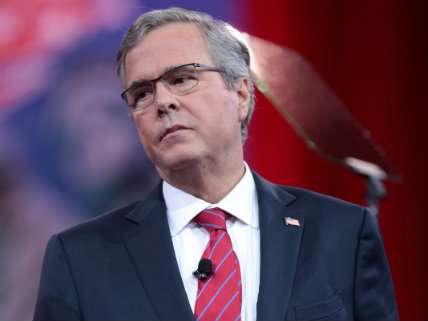Jeb Bush Is Dropping Out of the GOP Race. Here's Why I'll Miss His Campaign.
With Trump in the race, the former Florida governor couldn't compete.

There were more than a few reasons for a libertarian (or, okay, anyone) to dislike Jeb Bush: his consistent support for his brother George W. Bush's administration, his aggressive backing of awful government surveillance programs, his general air of hawkishness, and the easy, entitled comfort with which he slipped into his place as the early favorite of the Republican party establishment. Jeb Bush and his supporters stood for continuity with the GOP under his brother, and all that was wrong with it.
As the race started, I was prepared to dislike him intensely—and yet I somehow developed a soft spot for him, a kind of sympathy, and a respect for the campaign he ran.
Much of that respect stemmed from the fact that, at least early on, Jeb Bush was clearly trying to run a campaign based on policy proposals. Like every Republican, he put out an absurd tax plan based on a fantasy of how cutting taxes works, but he also outlined plans to reform the regulatory state, to overhaul the entitlement system, and a set of ideas on how to reform government hiring and contracting processes, and restrain spending—along with a number of other proposals. Some of these ideas were stronger than others, but they were honest, earnest ideas about how to govern and make policy.
Jeb Bush wanted to be president. But he didn't seem to want to run for president. His initial campaign strategy was described, more than a little unfortunately, as "shock and awe"—the idea was that he would win in a walk after a show of power.
As in Iraq, that strategy didn't exactly work out, in part because of the breadth of the GOP field, and in part because of the entrance of Donald Trump. Trump seemed to delight in attacking Bush, in bullying his wonkier, more thoughtful competitor, and for most of the race, Bush struggled to respond effectively. Partly that was because Bush didn't have the killer instinct attacking Trump required, and partly because Bush seemed to regard Trump as a joke candidate who didn't need to be dignified with engagement. That was a mistake, but it was a telling one—and one that, to me at least, helped humanize Bush.
Bush didn't want to stoop to Trump's level, didn't want to play Trump's game, and, fundamentally, didn't really want to engage in the awful, ridiculous business of campaigning for president. Some of that was an undeserved sense of entitlement, but some of that, I think, was an abiding sense that the campaign circus was silly and undignified, a vulgar reality show contest. And Bush never really wanted to play the game. That Bush so obviously didn't relish the daily campaign fights, that he clearly didn't enjoy the stupidity and spectacle, was a big part of what I appreciated about him.
It's true, of course, that if Bush had been the frontrunner, and won the race in a walk as he initially hoped, I probably would have liked him less. His ineffectiveness made it easier to like him, because the bad parts of his campaign never really represented a threat. And yet I also have to admit that the campaign that Jeb Bush would have preferred is one that, after watching the Trump show for the last several months, I would have preferred too—a contest of issues and ideas and more or less honest arguments about policy and governance. Maybe Bush would have lost that contest too, ultimately, but it's one that would have served the country, and the Republican party, better.
Bush announced tonight that he is suspending his campaign. At this point, I'm not that sorry to see him go. But I will miss the smarter, calmer, less spectacular race that, in its best moments, his campaign seemed to represent.


Show Comments (261)